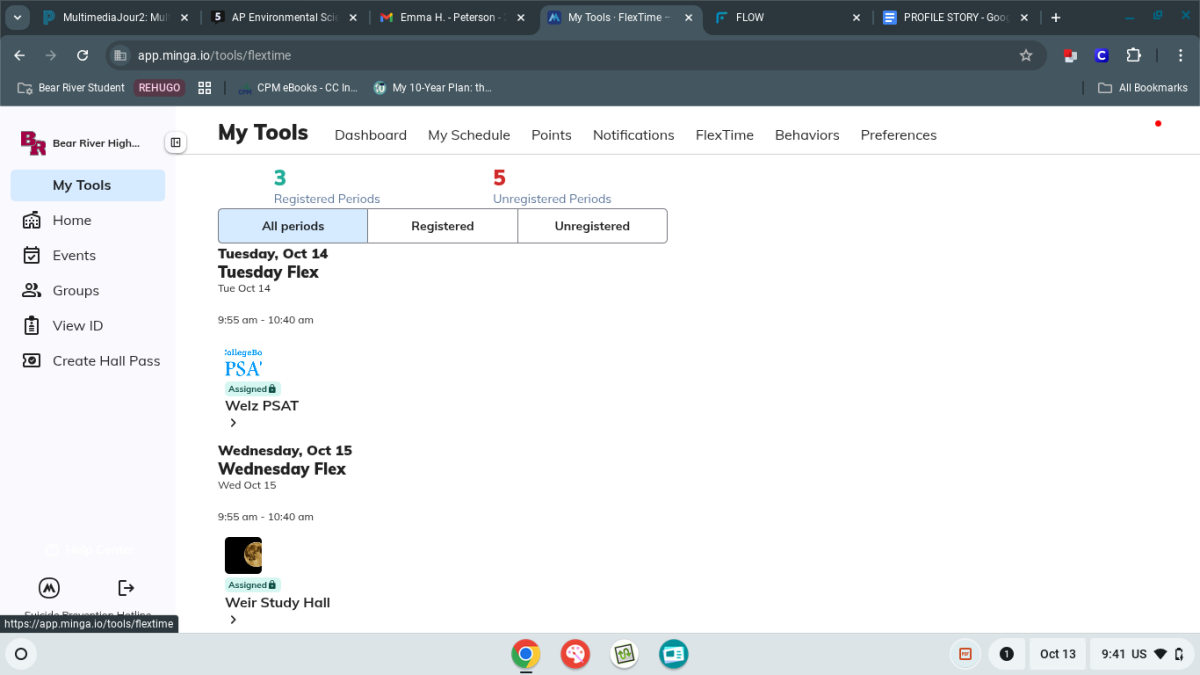High school includes four of the most important years in a teen’s life – and of these, junior year is arguably the most influential in a student’s future.
The process of seriously looking at college options normally begins in senior year. However, from looking through further education options, to SATs and ACTs, to a busy schedule consisting of extracurricular activities and working to build up their college resume, this upcoming year for Bear River’s juniors can pose a daunting obstacle.
Vikki Stanton, Bear River’s school psychologist, explained what the term stress means to a student.
“Stress affects people in different ways,” she said. “Stress creates the ‘fight/flight/freeze’ response in all animals, including humans. … What that means for students will depend on many other factors, including how resilient they are (how able they are to bounce back from setbacks), what kind of home and school supports they have, and their nature in general … stress is a response to many factors, not just academic.”
Juniors are constantly exposed to stories about junior year from their older peers. So, the tales of intense SAT studying paired with sifting through heaps of homework could result in sparking some anxious thoughts in many students. Junior Geneva Hemmert commented that she “heard a lot of mixed opinions on junior year.” She went on to explain.
“I’ve heard that it was the best, easiest, and then the hardest year, especially since colleges really begin to look into you as a student and person,” she said. “I’m not quite sure what to expect.”
As a junior and senior teacher, Matt MacDonald described the stress that he notices consistently through his junior students.
“Many juniors are starting to work and get a job, they’re playing varsity sports for the first time, they’re trying to balance all of those things, and it could lead to a lot of stress,” he said. “…I think the one thing that students learn the most junior year is time management and how to balance things, how to plan, how to stay on top of deadlines, try to organize their social life, work life, school life, family life, and that’s a hard balance I think. But I think it is certainly something that is difficult for juniors in particular.”
Along with the many responsibilities Mr. MacDonald outlined that many juniors are faced with, this is the year many begin to think about college applications. Of course, while academic grades have a large impact on the final decision made by the college, most also look into the extracurricular activities students participate in. This part of the application shows how well-rounded the student is. A couple of students voiced their concerns about managing their academic responsibilities as well as extra activities they have taken on.
“My junior year has been a lot harder than the other two,” said Olivia Lyman, a junior. “I have had to juggle more things, and move my personal life around to accommodate for all the extra homework, studying and assignments. Also in previous years, I have not taken that many AP classes. So, I jumped full feet in this year with three AP classes.”
“I am pretty anxious about this year just because I’m involved in a lot of school and not school-related things throughout the week that make it hard to keep up with everything,” said Hemmert. “But, I think I’ll personally be okay as long as I stay on top of things.”
Grace Billingsley, a senior who took four Advanced Placement (AP) classes her junior year, provided some insight on how her regular schedule changed from how it used to be.
“I definitely had to spend more time studying,” she said. “I had to stay up later to finish my homework. Because I had sports, there was a lot more that I had to do like keeping contact with teachers and make sure that I really made up everything because in AP classes, it’s super important.”
Mrs. Stanton explained that there could be a variety of reasons students feel anxious.
“Academic and extracurricular activities, if the student has a heavy load, will likely lead to stress,” she said. “Family circumstances, such as financial difficulties or stressed out parents, also can contribute significantly.”
Mr. MacDonald continued to describe his observations of the causes behind the stress many of his junior students suffer from.
“When I talk to students, a lot of the stress comes from deadlines and balancing that,” he said. “So one of the things students figure out on their own is their own system to help them organize their thoughts and their deadlines and what’s going on. … Some seek out advice on how to do that, and then there are a lot of them that just stay in the moment and try to get through the day and what do I need to do today … organization is key.”
He described how many of his particularly successful students “will write down all the things they have coming up and that helps as well,” which was one of the strategies Billingsley used as well to organize her thoughts. She also described some helpful options that helped her regulate her stress.
“A lot of what I did to help with stress was to keep track of what I had,” she said. “So, if I had an agenda or a calendar, then I knew exactly when everything was due. It really helped to just see what I had to do and when it had to be done so I could prioritize. I also took a lot of naps and meditation and did things for fun on the weekends to make sure I had some time for myself.”
Of course, it’s still too early to accurately predict how juniors will be able to handle their own stress. However, Lyman and Hemmert provided their insight on how they believe the upcoming year will play out.
“I am dealing with all the stress of my classes, sports, and clubs by not procrastinating, and knowing that I’ll give my 100% and that is enough for me,” said Lyman.
“Stress hasn’t really hit me too strongly yet, but I know for a fact that when finals and AP testing come around that I’ll be really overwhelmed,” said Hemmert. “I don’t deal with stress as well as I’d like to, but with taking AP Classes, it’s just something you have to learn to work around. And in real life too.”
Anxiety isn’t just an exclusive condition for juniors. All students will or have felt this feeling at some point. Mr. MacDonald provided some advice to those who are struggling.
“Just spend time for themselves,” he said. “Especially as life gets more hectic, we have our family responsibilities, responsibilities at work, responsibilities at school, responsibilities with our team, responsibilities with our friend group, and sometimes students just need to spend some time for them. Do things that make them happy.”
Mrs. Stanton also added some strategies to manage stress.
“It is really important to schedule some down time once a day,” she said. “You can use it to exercise, write, draw, or just think. Put away your phone and just be with yourself, which is a rare thing these days. It is important to spend that time just to learn who you are and what you want – and to remove yourself from any source of stress as much as you can.”
Billingsley added a final piece of advice.
“I would say the biggest thing for sure is to just prioritize what you need to do,” she said. “And if you have any questions for studying for AP tests, just talk to other seniors. But the biggest thing is that you’re going to get through it. Senior year will be easier. So just buckle down and you’ll be alright.”



































